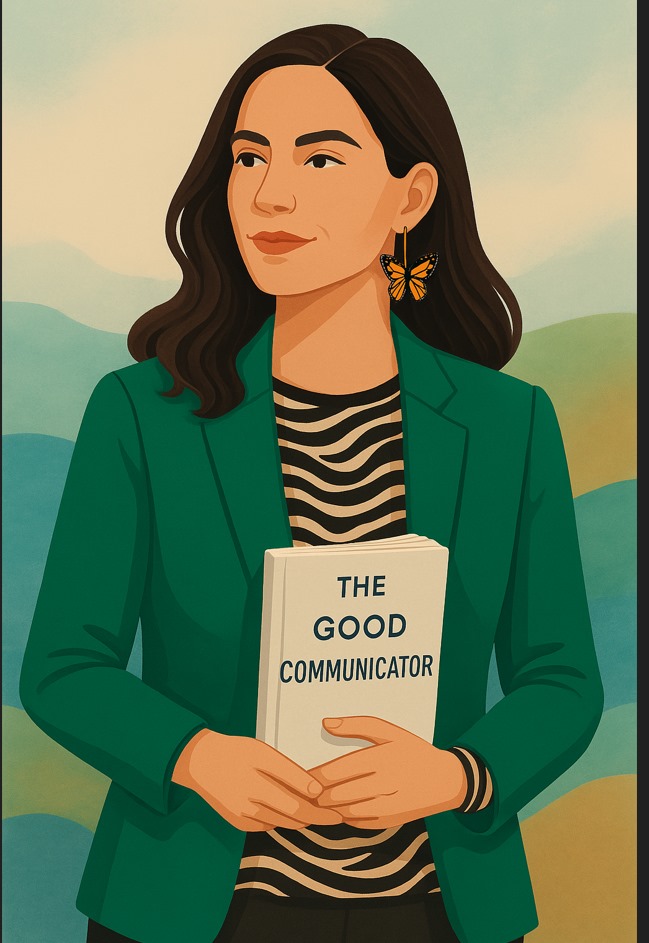Empowering Sustainability through Communication and Leadership – An Interview with Virginia Cinquemani

Empowering Sustainability through Communication and Leadership – An Interview with Virginia Cinquemani
April marks Earth Month, a time when the world reflects on the urgent environmental challenges we face and the solutions that can drive meaningful change. As part of LadyShip’s Round Table 2025 series, our April theme ‘Voices for the Ocean: Women Leading Change through Communication and Action‘ highlights the vital role of women who use knowledge, leadership and strategic communication to protect our planet—especially our oceans.
In this spirit, we’re honoured to feature Virginia Cinquemani, a leading sustainability expert and founder of Green Gorilla. With a background in sustainable building and a passion for empowering others, Virginia has dedicated her work to one powerful mission: helping technical professionals find their voice and become sustainability champions.
Virginia’s work focuses on equipping leaders with the knowledge and skills to integrate sustainability into their decision-making processes. In her books SustainABLE and her recently launched book The Good Communicator. How to Make Sustainability Irresistible, she highlights the importance of combining technical expertise with emotional intelligence to create impactful change and how to be able to communicate in a simple, effective way. The book shows how to inspire and influence others by crafting the sustainability message, rather than simply conveying facts and data. The aim? Generating collaborations to co-create new futures.
Through this inspiring conversation, Virginia explores how communication can bridge the gap between technical knowledge and impactful action, especially in sectors like shipping and maritime that are deeply connected to ocean health. We also explore how feminine leadership, collaboration and education are key ingredients to building a truly sustainable future.
LR: Can you tell us a bit about your background and what inspired you to focus on sustainability and leadership?
VC: I started my career as an architect two decades ago. While at university, I had a lecturer who was an early pioneer in what was called at that time “bio architecture”, what we would call today sustainable building. Although he was the only one talking at the time about natural materials, renewable energy sources and healthy buildings integrated in nature, it left a profound sign in me. I quickly realised that, by designing buildings in a standard way, I was contributing to a global problem: our planet was rapidly becoming more polluted and inhabitable than I was ready to accept. This is when I decided to do something about it. I got a Masters in Energy Efficient and Sustainable Building and spent the next 15 years working to make building practices more sustainable. In this process, I trained thousands of sustainability professionals in technical subjects and realised that we are actually facing a wider issue than just the quest to find solutions to these issues: the inability of technical professionals to communicate sustainability effectively.
In fact, we have already most of the solutions we need to tackle global, systemic and interconnected issues like climate change, the health of our oceans and biodiversity loss. But as technical professionals and leaders (not just in construction, but in every sector), we seem to be unable to pass that message on powerfully and influence our colleagues, supply chains, boards of directors and clients to change behaviours and embrace sustainability. This is how my company, Green Gorilla, was born: to train and coach sustainability professionals and leaders to become impactful sustainability champions and find their voices.
LR: Your books have been highly impactful in the sustainability space. Could you share their core message and how they connect to the idea of sustainable oceans?
VC: Sustainability is not a fancy add-on or a tick-box exercise in a company’s Corporate Social Responsibility plan. Oceans are suffering from a range of well-known and documented issues, from acidification, which prevent them from absorbing excess carbon emissions from the atmosphere, to biodiversity loss (and when one species dies, many others in the food chain die as a consequence, which will eventually be fatal for our human species) to plastic and fossil fuel oil pollution. Far from what most people think, it’s not just an ethical issue: all of this is leading to catastrophic consequences that directly affect our businesses and livelihood, mostly caused by unsustainable working practices and indiscriminate exploitation of our seas.
While we are aware of the massive scale of the impact of the maritime sector on the oceans, there are plenty of wonderful people working tirelessly to implement solutions that could mitigate and reverse its potentially catastrophic consequences. However, they might feel overwhelmed by the magnitude of the task ahead; they might be brilliant technically, but lack the interpersonal skills to influence others to change behaviours; they might fight against a system that is stuck in its old ways of operating.
I wrote and published SustainABLE in 2020 to provide a self-help manual for these people, with some practical techniques to help them refine the way they speak and “sell” sustainability to others, but also to develop their resilience and organise their workload and priorities so that they don’t end up in burnout.
In the last five years though I realised that I needed to deep-dive into communication, the biggest challenge of all, and provide a step-by-step approach to have better conversations that lead to powerful results, which serve a purpose for everyone involved. That is the mission of my second book, The Good Communicator.
LR: How do you see the role of women in science contributing to ocean conservation and sustainability?
VC: I have been championing women in science and more specifically in sustainability for years now, not because I think we are in any way better than men, but because we are underrepresented and could offer a different perspective to the male-dominated narrative that has led to the point we are now.
Individualistic, profit-led business attitudes have created the problems humanity face today. To change our destiny, preserve and regenerate our oceans we need to collaborate and co-create solutions, and that’s only possible by embracing well-researched and unique feminine leadership qualities: empathy, as on average women can connect on a human level better than our male counterparts; vulnerability, which can lead to a more open, safe and authentic working culture, which in turns can lead to personal and collective growth; recognising the value of creativity and innovation; collaboration and teamwork; diversity and inclusivity; and ethical and responsible leadership.
Most of my clients are women who don’t feel they have the leadership qualities to champion sustainability at scale, and I spend much of my time showing them how actually most of this belief is conditioned by society. My aim is to empower women to work with their male counterparts at the same level and provide that long-term, collaborative perspective that will make a real difference to the planet.
LR: What role do you think formal education (schools, universities) and informal education (workshops, awareness campaigns) play in promoting sustainable practices for oceans?
VC: Early education is fundamental to grow people’s awareness of the issues from a young age and internalise their love for the oceans. Any early memory of visiting the seaside stays with us forever, and if those places we remember and love disappear or are changed beyond recognition, it can cause a strong grieving process called solastalgia. The upside of this is that people who have a personal and emotional connection with nature will be more likely to act to protect it. If we want the planet and our oceans to heal we need to get more people to love them so much they would do anything to protect them and regenerate them.
But of course education is important at any stage to plant the seed of change and to make people aware of the issues… and while on its own it doesn’t change behaviours, especially later in life when it’s harder to create an emotional reaction to anything that doesn’t affect us personally, there are courses which are more tailored towards action, that have an element of coaching to support people to take those actions and overcome personal barriers in doing so, and that use storytelling to convey the messages in a more personal and engaging way.
LR: Women have historically played a crucial role in environmental science and leadership. What challenges do they still face, and how can we empower more women in sustainability?
VC: It’s quite disconcerting that, in 2025, we are still talking about the contribution of women to the sustainability debate, but the reality is that women leaders are still a minority and that as women we need to push much harder to get our voice heard. Partly to blame are historical habits and male-dominated business cultures, but I believe that as women we also often lack confidence in our own abilities to make a difference. As an example, as a coach I see many brilliant and highly qualified female sustainability professionals struggling to ask for a pay rise, driven by a sense of justice and humility, convinced that their qualities will be recognised by the top management without the need to ask. Or female entrepreneurs not pricing their services right because they fail to see their full value.
One way to address this is to come together with other women in sustainability – there are some brilliant networks out there for every sector – and leverage other women’s support to find strength and compare notes, but also to celebrate successes and share knowledge. Sustainability is truly a team effort and as women we can find our voice better when we feel supported by others on the same journey.
LR: How can listeners connect with your work, access your book, or follow your journey in sustainability?
VC: I like to hang out on LinkedIn, where I share my thoughts and learning with my network, but also, I’d love for people to check out my website, where I share a lot of free resources and links to my books:
Let’s Take the Conversation Further
If this conversation with Virginia Cinquemani resonated with you or sparked ideas for your organisation, we’d love to hear from you.
As part of our commitment to advancing sustainability in the maritime, energy and wider industrial sectors, LadyShip’s Round Table and Virginia have partnered to offer tailored sustainability workshops, talks and strategy sessions.
Whether you’re looking to equip your team with practical communication tools, inspire sustainability leadership or begin your own transformation journey—get in touch.
You can reach out directly via social media or contact Isabela via [email protected]
Let’s work together to make sustainability more actionable, inclusive and impactful—across every sector.
